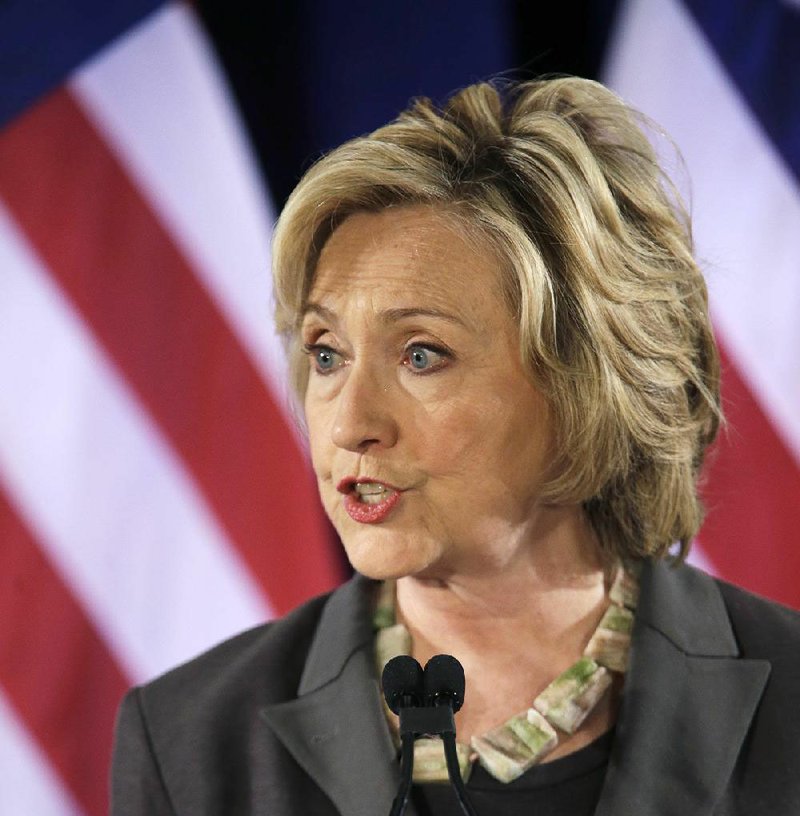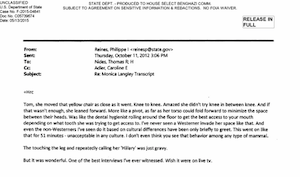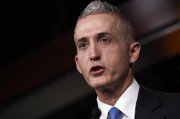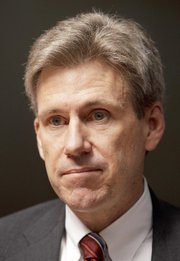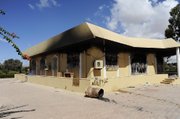Hillary Rodham Clinton's campaign said Saturday that she will testify Oct. 22 before the House select committee investigating the deaths of four Americans in Benghazi, Libya, but the details of her appearance were almost immediately challenged by a spokesman for the committee.
Clinton campaign spokesman Nick Merrill announced the date and said her testimony would be public.
But James Ware, a spokesman for the committee, said the timing is not set because of ongoing negotiations with Clinton's lawyer over ground rules.
The wrangling is part of months of back-and-forth between the Republican-led committee and Clinton, whose allies accuse the panel of conducting a fishing expedition for material that might be used against her as she runs for president in 2016.
U.S. Ambassador Christopher Stevens and three others were killed when militants overran two U.S. compounds in the restive Libyan city in September 2012, in the waning months of Clinton's tenure as secretary of state. She has said she had no direct role in security decisions surrounding the U.S. facilities, but Republican critics say the State Department denied protections that might have prevented the attack.
As of Friday, Clinton's attorney, David Kendall, was still negotiating terms for his client's appearance, Ware said.
"On the grounds of simple fairness and in order to make appropriate preparation possible, the scope of the questioning be consistent with the scope set forth in the resolution establishing the Select Committee on the Events Surrounding the 2012 Terrorist Attack in Benghazi," Kendall wrote, according to an excerpt of his Friday letter released by the committee.
"Secretary Clinton's campaign may want to reach out to her lawyer," Ware said Saturday.
Merrill, however, responded with a second statement disputing that negotiations were continuing. "We have made clear that we understand emails are in their jurisdiction," he said. "So unless the committee now believes emails are no longer in its jurisdiction, we are in agreement."
The Benghazi committee, in the course of its investigation, discovered that Clinton had used her personal email account for State Department business.
The Oct. 22 date would give the committee months to receive from the State Department, and then examine, troves of email traffic involving Clinton's aides.
Kendall told the committee May 4 that Clinton was willing to testify the week of May 18. But the committee chairman, Rep. Trey Gowdy, R-S.C., never scheduled the hearing. He said he would not call her to testify until the State Department had turned over all the documents he had requested.
Since then, Gowdy has repeatedly criticized the State Department for withholding documents. This month, he postponed the testimony of several of Clinton's aides, saying he could not question them until he had all of the relevant documents from the State Department.
Clinton had long offered to testify in public, but Gowdy had initially said he preferred a private interview. Although he said he was trying to keep the session from becoming a circus, Clinton's team objected on grounds that a private session could allow Republicans to selectively leak unflattering details.
The committee Saturday appeared to reject Kendall's terms, which included that the hearing date, once set, would not change.
"Her email arrangement clearly falls within the scope of the Select Committee's jurisdiction," Ware said.
"The Committee will not, now or ever, accept artificial limitations on its congressionally directed jurisdiction," Ware said in a statement. "Once there is an agreement on the date and a better understanding of how, if at all, Secretary Clinton's lawyer's latest writing differs from previous ones, the Committee will announce said hearing date."
classified information
Merrill said Clinton accepted the committee's invitation Friday, the same day that inspectors general for the State Department and the nation's intelligence agencies said they had discovered classified information on the private email account Clinton used while she was secretary of state.
Clinton said Saturday that she never knowingly sent or received classified information using her private email server and did not know what messages were being cited by intelligence investigators as examples of emails containing classified information.
The two inspectors general said Friday that the information they found was classified when it was sent and remains so. Information is considered classified if its disclosure would be likely to harm national security. The investigators said the information was not marked as classified but should have been stored only on government computer networks with special safeguards.
"This classified information never should have been transmitted via an unclassified personal system," Steve Linick, the State Department inspector general, said in a statement signed by him and I. Charles McCullough III, the inspector general for the intelligence agencies.
"What I think you're seeing here is a very typical kind of discussion, to some extent disagreement among various parts of the government, over what should or should not be publicly released," Clinton said after a Democratic gathering at the Madison County Historical Complex in Winterset, Iowa.
The federal watchdog asked the FBI to review whether potentially classified material had been jeopardized during a State Department review of the documents in preparation for releasing them publicly.
Asked if the Justice Department should investigate, Clinton said: "They can fight over it or argue over it. That's up to them. I can tell you what the facts are."
More Clinton emails are expected to be released by the State Department this week, Merrill said.
"We want to ensure that appropriate procedures are followed as these emails are reviewed while not unduly delaying the release of her emails," he said. "We particularly do not want their release to be hampered by bureaucratic infighting among the intelligence community."
Clinton turned over 30,000 emails to the State Department after her use of a private email system became an issue. The emails are being reviewed for release to Congress and the public.
The inspectors general said the State Department had agreed to allow intelligence officials with expertise in Freedom of Information Act releases to play a role in the review. But the inspectors general said the department still had not created a process for resolving disputes between the department and other parts of the government about differences over how to classify documents.
"There have been recent examples, such as the Senate Intelligence Committee's report on torture, where release of information was delayed because of disagreements among agencies," Merrill said in his statement, "and we hope that will not happen here."
Information for this article was contributed by Anne Gearan of The Washington Post; by Michael S. Schmidt and Maggie Haberman of The New York Times; by Chris Strohm of Bloomberg News; and by Catherine Lucey of The Associated Press.
A Section on 07/26/2015
